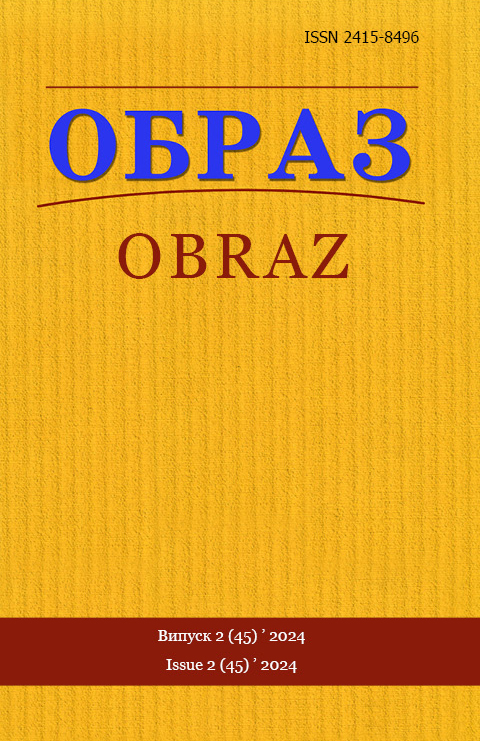Abstract
Introduction. The basic functions and problems of the modern Ukrainian literary contests were drafted in this article. In Ukraine, the literary contests emerged in 1990th out of necessity to fill the national book market with books, written in the Ukrainian language. In the Ukrainian scientific discourse, they are still considered an advertising tool.
Relevance and goal. Since one function of the literary contests gets too much attention, while the others are ignored, that negatively affects its institutional stability. This explains the importance of paying attention to the other different functions, the complex of which supplies institutional stability in crisis periods. This study’s purpose is to outline the functions of modern Ukrainian literary contests and the main problems affecting their institutional stability.
Methodology. The results of the survey of the Ukrainian authors served as source data. Their answers were analyzed and systemized by statistical and content analysis methods.
The results. The results show that the literary contests as an institution, except for the informational and advertising functions, perform expressive and motivational functions. The literary contests can also form reading preferences, provide communications, and monitor the book market trends. There are unique functions that belong only to the literary contests whose subject of evaluation is unpublished works. As was found, they work as a mediator between authors and publishers, as literary agencies do. They also support the Ukrainian language by establishing strict language requirements for submitted works. Determined three groups of problems of literary contests that stop the development of their functions: 1) the problems related to organizing processes; 2) the problems related to judges; 3) the problems, which are not under the control of the institution.
Conclusions. Literary contests as an institution must maintain many different functions that are still not studied enough on the theoretical level. Their functions are also implemented not sufficiently on the practical level, which caused the institutional instability of the literary contests.
References
1. Dane, A. (2020), “Hierarchies of Legitimacy: Gender and Literary Prizes”, In A. Dane, Gender and Prestige in Literature, Palgrave Macmillan, Cham, pp.123–176. DOI: https://doi.org/10.1007/978-3-030-49142-0_5
2. Demoor, M., Saeys, F., & Lievens, S. (2008), “And the winner is? Researching the relationship between gender and literary awards in Flanders, 1981–2000”. Journal of Gender Studies, vol. 17(1), pp. 27–39. DOI: https://doi.org/10.1080/09589230701838370
3. Sapiro, G. (2016), “The metamorphosis of modes of consecration in the literary field: Academies, literary prizes, festivals”, Poetics, vol. 59, pp. 5–19. DOI: https://doi.org/10.1016/j.poetic.2016.01.003
4. Antonyk, O., & Zholdak, О. (2014), “Bоок competitions as mean activations of demand on book products”, Polighrafija i Vydavnycha Sprava [Printing and Publishing], 3, pp. 73–81.
5. Bondar, О. (2019), “Concept ‘literary prize’: problems of description”, Polighrafija i Vydavnycha Sprava [Printing and Publishing], 2(78), pp. 117–125. DOI: https://doi.org/10.32403/0554-4866-2019-2-78-117-125
6. Herasymenko N. Popular literature of the end of the XX-th – the beginning of the XXI-th century, Dzhura, Ternopil, 264 p.
7. Zhulynskyi M. (2019), “Triumph of a Ukrainian word”, in Koronatsiya slova : scientific and reference edition, Svit Uspikhu, Kyiv, p. 18.
8. Kopystynska, I. M., & Grynivskyi, T. S. (2015), “Book’s publishing promotion ways: the experience of independent Ukraine”, Naukovi Praci. Serija: Socialjni Komunikaciji [Scientific Works. Serie: Social Communications], vol.1(50), pp. 37–46.
9. Liebiedieva Y. (2019), “Russia’s hybrid warfare against Ukraine in 1917–1921 and 2014–2019 and Ukrainian governments’ activities for overcoming the results of the aggression”, Ukrajinoznavstvo [Ukrainian Studies], vol. 2(71). pp. 57–72. DOI: https://doi.org/10.30840/2413-7065.2(71).2019.171753
10. Logush, T., & Logush, Y. (2019), “The 20th anniversary of the ‘third wave’ of modern Ukrainian literature”, in Koronatsiya slova : scientific and reference edition, Svit Uspikhu, Kyiv, pp. 20–31.
11. Masyk, M., & Klymenko, O. (2022) “Theoretical fundamentals of research of institutional resistance problems in interdisciplinary discourse”, Vcheni zapysky TNU imeni V. I. Vernadsjkogho. Serija: Publichne upravlinnja ta administruvannja [Scientific Notes of Taurida National V. I. Vernadsky University. Series: Public Management and Administration], pp. 53–58. DOI: https://doi.org/10.32782/TNU-2663-6468/2022.5/09
12. Mykolaienko, А. (2014), “Smoloskyp” as a center of self-realization of modern creative youth”, Dialogh: Media-Studiji [Dialogue: Media Studies], 18–19, pp. 492–502.
13. Ohar, E. (2011), “Literary and publishing contests in the promotion of children’s books”, Naukovi praci Kam’janecj-Podiljsjkogho nacionaljnogho universytetu imeni Ivana Oghijenka: Filologhichni nauky [The research papers of Kamianets-Podilskyi National Ivan Ohiienko University: philological studies], vol. pp. 233–236.
14. Rodyk, K. (2019), Sisyphus XX: book vs politics, Baltija-Druk, Kyiv, 352
15. SMOLOSKYP (2024), “Conditions of participation”, available at: http://www.smoloskyp.org.ua/umovy-uchasti/ (last visited 28 June 2024).
16. Khmil-Chupryna, V. (2020). Popularization of reading literature in Ukrainian mass media, PhD diss. (hist. sci.), Kremenchuk Mykhailo Ostrohradskyi National University, Dnipro, 202.

This work is licensed under a Creative Commons Attribution 4.0 International License.

